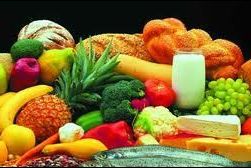 Can you eat the food of a whole week in a single day? …Rather not. Then, why try and eat a whole day’s food as a single meal? Or are you willing to become a diabetic first in order to follow the recommendation to eat every 3 hours (e.g. breakfast at 08.00, morning snack at 11.00, lunch at 14.00, afternoon snack at 17.00 and dinner at 20.00)? Why wait and not start now, before having problems with metabolic syndrome and diabetes mellitus?
Can you eat the food of a whole week in a single day? …Rather not. Then, why try and eat a whole day’s food as a single meal? Or are you willing to become a diabetic first in order to follow the recommendation to eat every 3 hours (e.g. breakfast at 08.00, morning snack at 11.00, lunch at 14.00, afternoon snack at 17.00 and dinner at 20.00)? Why wait and not start now, before having problems with metabolic syndrome and diabetes mellitus?
Taking snacks (or foods eaten between meals) helps us never to be extremely hungry and never to have a heavy stomach. It is a good idea to make smart choices about your daily snacks. To have decided in time what to eat, so that you do not eat with bulimia whatever you come across with when hunger “strikes”. Many foods that seem to be of great nutritional value are not! For example, cereal bars may have been packed with unhealthy fats and additional sugar or some “low-fat” foods may contain much added sugar and salt.
1. Remember breakfast – We have all heard about the nutritional value of breakfast. Recent studies of very large numbers of volunteers with a very long follow-up have clearly shown that as the amount of food consumed for breakfast increases, the body weight decreases. This is not strange considering that in order for someone to be in the position to eat much in the morning they must have slept on a light stomach at night. We know that taking breakfast activates (increases) metabolism.
2. Snacks with nuts – Unsalted nuts and seeds are excellent snacks. Almonds, walnuts, peanuts, hazelnuts, roasted pumpkin seeds, linseeds etc contain many healthy nutrients, are more likely to give you a feeling of fullness (unlike e.g. chips or cookies) especially if you drink some water with them as well, and, of course, are friendlier to the teeth with regard to the risk for tooth decay. However, keep the quantities of nuts low, because they contain many calories.
3. Choose balanced combinations – At each meal and snack, ideally all macro-nutrients, i.e. proteins, fats and carbohydrates, should be consumed. For example, eat some nuts (proteins + fats) together with a banana or raisins (carbohydrates) or try some whole-grain crackers (carbohydrates) with fat-free cheese (proteins + fats).
4. Undisturbed and unhurried meals and snacks – When eating a meal or a snack do not do anything else, such as e.g. surfing the internet, watching TV or working at your desk. Take a break for a few minutes to eat.
5. Take them with you – If you carry nuts or other healthy snacks with you in your bag, you will probably not attack chips, chocolates or biscuits when you take your break.
Of course, do not forget that there is no correct diet without regular physical activity and exercise.
Last modified 22/02/2014






